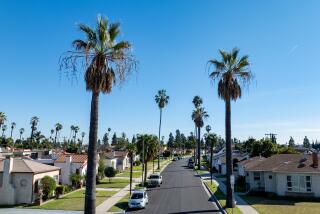Op-Ed: Should Venice secede from Los Angeles?
When, in the course of human events, there are Venice residents who desire to dissolve their bonds with Los Angeles, or “Vexit,” in the hope of securing an independent community — a course the Venice Neighborhood Council is exploring — a decent respect to the opinions of their neighbors requires that they declare why.
Nick Antonicello, who heads the new committee on cityhood, says small municipalities work well.
“People in Venice like home rule,” he told City Watch L.A. “They like to control their own destiny.”
Neighborhood council secretary Melissa Diner told Curbed L.A. that Vexit “would take back control by establishing a more direct connection to tax revenues. Those revenues can be used to return Venice to what it was supposed to be, a safe haven for artists and unique culture. Right now, everyone feels like they pay in, but they never see it again.”
For all its flaws, isn’t L.A. much more vibrant than Santa Monica, Manhattan Beach, West Hollywood and every other tiny municipality of comparable wealth?
She added, “It doesn’t matter what your agenda is, cityhood gives you more direct access to it.”
I hold these truths to be self-evident: that cityhood would, in fact, advance some agendas and hinder others; that the alliance of pro-development and anti-development Venetians backing Vexit suggests that one faction is in for disappointment; and that while all men are created equal, the individuals who self-select to live in an enclave known for its art, crime, bohemian spirit and homeless encampments could be less well-suited to independence, on average, than other neighborhoods.
That isn’t a knock against Venetians. I am one. And having spent my career covering politics at the local, state and national level, I can attest that many of my fellow renter-class neighbors here seem less intent than most in controlling their political destiny. They’re far more interested in art, or tech, or yoga, or cold-pressed juice or surfing. Some are so apolitical that they don’t actually know whether they are currently residents of Los Angeles. For the most part, this is to their credit — they’re good company. But I would not put us in charge of street maintenance or draft us to balance a budget or pore over a multimillion-dollar trash contract.
Fiscally responsible people would never spend as much as we do in rent!
Then there are the wealthy homeowners who surround us. If they come to share a city government exclusively with folks in this tiny neighborhood, so that they’re checked only by renters who are more transient, younger, relatively less likely to vote and much less likely to fund campaigns, their relative power in local affairs will gradually increase. And they will inevitably assert their interests — that is to say, they will work to protect their property values by blocking new developments, especially apartments aimed at the non-wealthy.
They will be assisted by “preservationists,” people willing to preserve the look and feel of Venice at the expense of affordability. The end result, intended or not, would be a community trending toward the feel of Sausalito or Carmel, those lovely museums filled with millionaires and pampered dogs. In that future, more Venice tax dollars would admittedly flow to local art, but the scene would look more like Laguna Beach than the avant garde imagined by Vexit proponents.
And that presumes a Vexit where the new local government is fairly competent at carrying out the agenda of homeowners and tech companies that could dominate this enclave more easily than they can influence Los Angeles at large. The darker scenario would be massive dysfunction of a sort that could flow from different risk factors.
What if we have to pay more for policing or schools? How would an independent Venice deal with having a hugely disproportionate number of L.A. County’s homeless as residents? What about government watchdogs? Many formidable journalistic outlets invest in covering L.A. City Hall. It is hard to imagine comparable media resources or output in an independent Venice. Insufficient sunlight of that sort has allowed corruption to flourish in small South L.A. municipalities.
Finally, the odds of a successful Vexit, which would require the consent of the rest of Los Angeles, are so long that one has to wonder whether the efforts of our local representatives would be better spent working to improve our lot through the existing system.
Like almost everyone who lives in Venice, I sometimes wish the city of Los Angeles did one thing or another better. But for all its flaws, isn’t L.A. much more vibrant than Santa Monica, Manhattan Beach, West Hollywood and every other tiny municipality of comparable wealth?
“As a sentimental concept, ‘neighborhood’ is harmful to city planning,” the visionary sociologist Jane Jacobs wrote. “It leads to attempts at warping city life into imitations of town or suburban life. Sentimentality plays with sweet intentions in place of good sense.”
Vexit is sentimental. There is value to Venetians and non-Venetians alike in our being part of a sprawling, diverse, global city of millions. We Venice residents can love and improve our neighborhood without leaving that behind.
Conor Friedersdorf is a contributing writer to Opinion, a staff writer at the Atlantic and founding editor of the Best of Journalism, a newsletter that curates exceptional nonfiction.
Follow the Opinion section on Twitter @latimesopinion or Facebook
More to Read
A cure for the common opinion
Get thought-provoking perspectives with our weekly newsletter.
You may occasionally receive promotional content from the Los Angeles Times.






